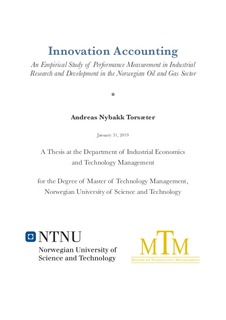| dc.description.abstract | The technology risk aversion among decision makers in the oil and gas industry leads to over-cautious technology decisions. To enable an acceleration of technology development and adoption on the Norwegian Continental Shelf, the need for new ways to measure innovation performance are escalating. This thesis assessed various approaches to R&D performance measurement, and identified some key characteristics of a project level measurement system which is both theoretically sound and practically useful. Further, the thesis examined performance measurement in industrial R&D, by use of a survey of the DEMO2000 program portfolio.
The R&D projects had set a broad range of project specific goals, which were generally suitable for fostering both project excellence and creative freedom. Even though goals who supported customer interactions and collaborations were to some degree lacking. The performance measurements used by the projects seems to fail compared to what the literatures conceders as ‘highly effective’. The actual usage of the measurement output is decisive for the effectiveness of performance measurement. However, only 30% of the projects assess their KPIs within the frequency which in the literature is considered to be sufficient (monthly).
To better understand the entire technology value proposition of a new product development, the R&D project needs to build strong relations between researcher, developers, and customers, with a multi-disciplinary approach. This interplay both can and should be measured by KPIs, to ensures the project is delivering according to plan (business process perspective) and asking the right questions to the right people (customer perspective). However, currently, only a handful of the survey respondents seem to capture these important aspects in their performance measurement procedures. A holistic performance measurement system, which captures both the potential value proposition and the project progress, while the right competence is involved, is considered to make innovation teams thrive. However, the lack of effective measurement systems in the DEMO2000 projects, may increase the risk of the ‘wrong’ products being built. In that case, optimizing the product will not yield significant results. | nb_NO |
